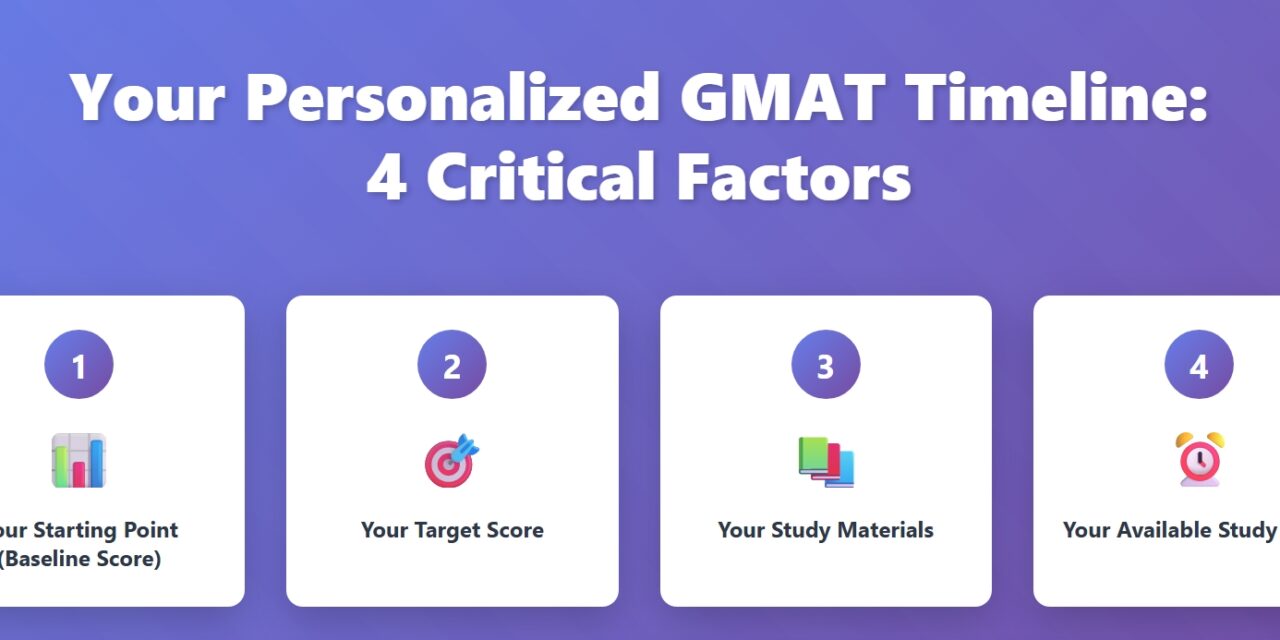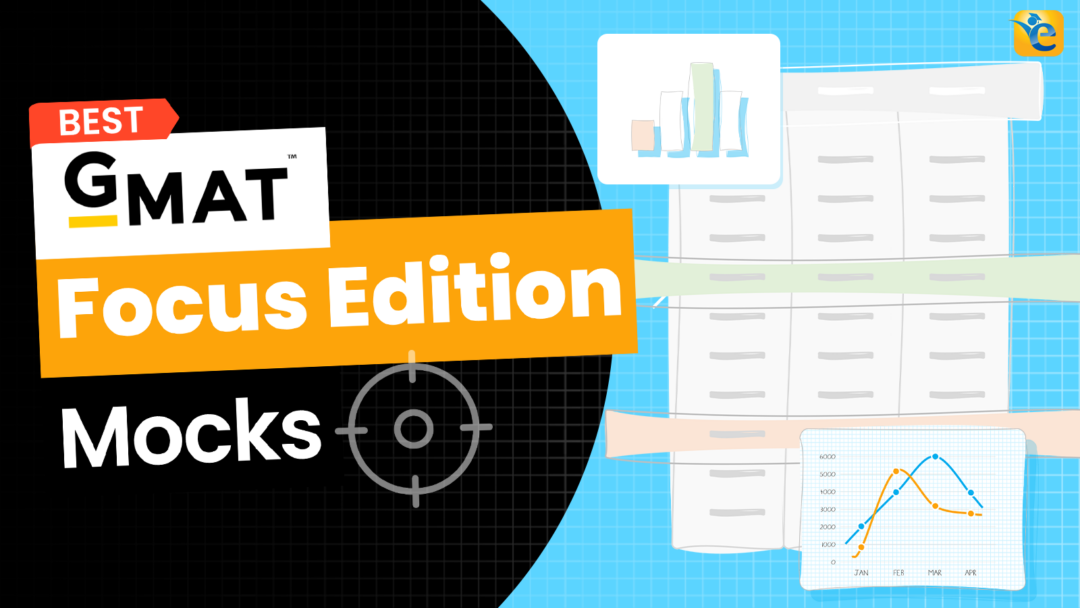The Truth About GMAT Preparation Time
Sankha scored a GMAT Focus Edition 715 with just 30 days of preparation. While Dhananjay, who worked 60+ hours a week full-time, needed 18 months to prepare and score the same. What did Sankha know that most GMAT test-takers don’t?
The reality is that when it comes to GMAT preparation time, one-size-fits-all timelines simply don’t work. Your GMAT journey is uniquely yours. The time required to reach your target score depends on specific factors that vary dramatically from person to person. Understanding these factors is the key to creating a realistic, personalized GMAT preparation timeline that maximizes your chances of success.
In this guide, you’ll learn:
- The key factors that determine your actual GMAT preparation time
- How to calculate a GMAT personalized timeline using our research-backed formula
- Practical strategies to optimize your study efficiency
- Realistic timelines for different starting points and score goals
Take This Quiz to Find Out Your GMAT Preparation Time
Unsure how much time you need to prepare for the GMAT? Take our quiz to estimate your preparation time based on your current skills.
How Long Do You Need
to Score 705?
Get a personalized study timeline
Based on your current level and target score
Know which section to prioritize
Quant, Verbal, or DI — see where to focus first
Define your target percentiles
Clear metrics for each section to hit your goal
✅ Ready to discover YOUR personalized GMAT timeline like Sankha did?
Our AI-powered study planner analyses your unique situation to create an optimal path to your target score – saving you up to 120 hours of preparation time.
- Take This Quiz to Find Out Your GMAT Preparation Time
- Debunking Common Myths About GMAT Preparation Timeline
- Four Key Factors That Determine How Long It Takes to Prepare for GMAT
- How Long Does It Take to Prepare For GMAT: The Timeline Formula
- Creating Your Personalized GMAT Prep Assessment
- Realistic GMAT Preparation Time for Different Score Improvements
- Common Time-Wasting Tactics to Avoid in Your GMAT Prep
- How to Prepare for GMAT: Your Personalized Action Plan
- Frequently Asked Questions About GMAT Preparation Time
Debunking Common Myths About GMAT Preparation Timeline
Before diving into the personalized approach, let’s address some widespread misconceptions that cause anxiety and inefficiency for GMAT test-takers:
Myth #1: “Everyone needs 3-6 months to prepare for the GMAT”
Reality: GMAT preparation time varies dramatically based on your starting point, target score, study materials, and available time. Sankha reached her target score in just four weeks, while Dhananjay needed eighteen months for his improvement. There is no standard GMAT preparation timeline that applies to everyone.
Myth #2: “More study hours automatically lead to better results”
Reality: Quality and focus of study time matter more than quantity. Targeted study addressing your specific weaknesses leads to faster improvements than unfocused preparation covering material you already know.
Myth #3: “You should follow standard GMAT study plans available online”
Reality: Generic study plans often waste time on areas you already know while neglecting areas where you need improvement. Consider Jack and Jill, who both scored 585 overall but had completely different section breakdowns (Jack: Q84/V76|DI77, Jill: Q77/V83|DI77). Following the same generic GMAT prep plan led them both to waste time studying material they already knew.
Myth #4: “You need to reach excellence in both Quant and Verbal”
Reality: Optimal score combinations vary based on your starting point and natural strengths. Aiming for perfection in your weaker area typically requires much more effort and has a lower probability of success than leveraging your strengths.
Myth #5: “Most people can realistically commit to 20+ hours of weekly study”
Reality: eGMAT’s Data consisting of thousands of students shows 65% of GMAT students promise themselves unrealistic study schedules of more than 20 hours weekly, but only 5% actually hit those targets. Being realistic about your available study time is crucial for planning your GMAT preparation time.
Calculate Your Personalised GMAT Study Timeline
Instead of falling for these myths, learn the 4 key factors that determine YOUR personal timeline and shows you how to calculate exactly how many study hours you’ll need based on your starting point, target score, and realistic schedule.
Four Key Factors That Determine How Long It Takes to Prepare for GMAT
Your GMAT preparation timeline depends on four critical factors that work together to determine how long you’ll need to prepare:
Factor 1: Your Starting Point (Baseline Score)
Your baseline score is the foundation of your GMAT preparation plan:
- For first-time test-takers: Take a diagnostic practice test after reviewing basic concepts
- For retakers: Use your most recent official GMAT score
Impact on Timeline:
- Lower starting scores typically require more preparation time
- Starting below the 40th percentile requires additional “confidence building time”
- Your section breakdown (Quant vs. Verbal) matters as much as your overall score
❓Quick Assessment: Do you know your starting point in both Quant and Verbal?
Take our industry-leading SigmaX Mock Test that provides detailed subsection analysis across Quant, Verbal, and Data Insights. Get the accurate baseline you need for effective timeline planning.
Factor 2: Your Target Score
Your target score directly impacts how long you’ll need to study:
- Research average GMAT scores at your target business schools
- Aim for 20 points higher than the average at your dream schools
- If you’re from a heavily represented applicant group, target 30+ points above the average
Strategic Approach: Multiple combinations of Quant and Verbal scores can yield the same overall score. The optimal combination depends on your starting strengths.
⭐ Stop Guessing Your Optimal Score Combination!
Our Personalized Study Plan doesn’t just help you pick a target – it analyzes YOUR strengths to recommend the most efficient Quant/Verbal combination that could save you 30-40% of your study time.
Factor 3: Your Study Materials
Your choice of study materials significantly impacts your GMAT preparation time efficiency:
- Online adaptive courses: ~8 hours per 10-point improvement
- Book-based preparation: ~14 hours per 10-point improvement
This 75% efficiency difference means your material choice could nearly double your preparation time.
Why the Efficiency Gap:
- Online adaptive programs provide immediate feedback on your performance
- They focus on your specific weaknesses, preventing wasted time
- Books follow a linear approach that may not address your needs efficiently
⚡ Experience the 75% Efficiency Difference Yourself!
Don’t just read about it – try our adaptive learning approach with:
- 15+ hours of GMAT Focus Edition video lessons
- 400 practice questions with detailed solutions
- Full adaptive mock test
- AI-powered personalized insights
Factor 4: Your Available Study Time for GMAT Preparation
Being realistic about your available study time is essential for calculating your GMAT preparation time:
- Working professionals: Typically manage 10-14 hours weekly (2 hours weekdays, 3-4 hours weekends)
- Full-time students: Can achieve 20-30 hours weekly (4+ hours daily)
Reality Check: Based on the data from thousands of eGMAT-ers, 65% of GMAT students commit to unrealistic schedules of more than 20 hours weekly, but only 5% actually achieve these targets.
Formula Application: Timeline (weeks) = Total Study Hours ÷ Weekly Study Hours
Get the proven study plan framework that saves 25% of prep time and doubles your chances of hitting your target score- Working Professionals GMAT Study Plan – Balancing Work & GMAT
How Long Does It Take to Prepare For GMAT: The Timeline Formula
Now that you understand the key factors, let’s calculate your personalized timeline using our research-backed formula:
The GMAT Preparation Timeline Formula
⭐ RESEARCH-BACKED FORMULA
Study Hours = [(Target Score – Current Score) × (Material Factor ÷ 10)] × [1 + CBT]
Where:
- Target Score: Your GMAT score goal
- Current Score: Your baseline score
- Material Factor: 8 for online courses or 14 for books
- CBT (Confidence Building Time): 0.25 if scoring below 40th percentile, 0 if scoring above
⭐Skip the Manual Math – Get Your Timeline Instantly!
Why calculate by hand when our AI does it for you? Our Personalized Study Plan uses this exact formula (plus thousands of data points) to create your precise timeline with week-by-week guidance.
Examples of GMAT Prep Timelines
Let’s walk through two examples to see how this works in practice:
Example 1: Raj (Working Professional)
- Current score: 555 (Q78/V79/DI76)
- Target score: 705 (Q86/V85/DI84)
- Improvement needed: 150 points
- Study materials: Online adaptive course (factor = 8)
- CBT factor: 0 (above 40th percentile)
Study Hours = [(705-555) × (8÷10)] × [1+0] = 120 hours
With 12 hours of weekly study time, Raj’s timeline is: 150 ÷ 12 = 10 weeks (approximately 3 months)
✅ See how Rhea achieved an incredible 140-point jump from 620 to 760 in just 40 days with a strategic study plan!
Example 2: Maya (College Student)
- Current score: 635 (Q83/V82/DI80)
- Target score: 705 (Q87/V84/DI84)
- Improvement needed: 70 points
- Study materials: Online adaptive course (factor = 8)
- CBT factor: 0 (above 40th percentile)
Study Hours = [(705-635) × (8÷10)] = 56 hours
With 30 hours of weekly study time, Maya’s timeline is: 56 ÷ 30 = 1.9 weeks (approximately 2 weeks)
⭐ KEY INSIGHT: Notice how starting score and weekly study commitment dramatically impact preparation time!
Creating Your Personalized GMAT Prep Assessment
Before diving into your GMAT preparation, you need to create a truly personalised Study Plan.
Follow the steps below –
Taking a Diagnostic Test to Establish Your Baseline
A thorough diagnostic assessment is the foundation of an effective GMAT preparation plan. Without an accurate understanding of your starting point, any timeline estimates will be unreliable.
❓Get Detailed Insights You Need For Your Dream Score
Our SigmaX Mock provides granular subsection analysis that reveals hidden weaknesses other tests miss. Join thousands who’ve used these insights for breakthrough improvements.
GMAT Strengths and Weaknesses Self-Assessment
Rate your confidence in each area on a scale of 1-5:
Quant Areas:
- Arithmetic: _____
- Algebra: _____
- Geometry: _____
- Number Properties: _____
- Statistics/Probability: _____
Verbal Areas:
- Reading Comprehension: _____
- Critical Reasoning: _____
- Sentence Correction: _____
Time Management:
- Quant section: _____
- Verbal section: _____
Determining Your Optimal Section Targets
For any target GMAT score, multiple combinations of Quant and Verbal scores can achieve that result. Choosing the right combination can significantly reduce your preparation time.
Consider these equivalent combinations that all achieve approximately a 705 total score:
| Quant | Verbal | Data Insights | Strategy Profile |
| 86 (91%) | 85 (94%) | 84 (97%) | Balanced Excellence |
| 89 (97%) | 83 (84%) | 83 (96%) | Quant-Focused |
| 83 (81%) | 88 (99%) | 84 (97%) | Verbal-Focused |
⭐ Key Insight: By leveraging your natural strengths, you can achieve the same total score while investing 30-40% less preparation time.
See how Rahul transformed his verbal weakness into strength to achieve 685 (97th percentile) on GMAT Focus
⭐Don’t Leave Your Score Strategy to Chance!
These combinations show what’s possible – but which one is RIGHT for YOU? Our Personalized Study Plan analyzes your specific strengths to recommend your optimal strategy and creates a week-by-week roadmap to get there.
Realistic GMAT Preparation Time for Different Score Improvements
Based on our research across thousands of GMAT test-takers, here are realistic timeframes for different score improvement ranges:
Small Improvement (30-70 points)
- With online courses: ~24-56 hours
- With books: ~42-98 hours
Example Timelines:
- Working professional (10 hours/week): 2-10 weeks
- Full-time student (25 hours/week): 1-4 weeks
✅ Find your personalized GMAT study timeline with official guidance by GMAC- How Long Should You Study for the GMAT™ Exam?
Moderate Improvement (80-120 points)
- With online courses: ~64-96 hours
- With books: ~112-168 hours
Example Timelines:
- Working professional (10 hours/week): 6-17 weeks
- Full-time student (25 hours/week): 3-7 weeks
Real Success Story: 535 to 655 GMAT | Q90
Watch Vivek’s inspiring journey as he achieved a 120-POINT IMPROVEMENT, including a perfect Q90 score. Learn his exact strategies for using targeted preparation tools, and strategic mock testing – proving that significant improvements are absolutely achievable with the right approach.
Significant Improvement (130-200 points)
- With online courses: ~104-160 hours
- With books: ~182-280 hours
Example Timelines:
- Working professional (10 hours/week): 10-28 weeks
- Full-time student (25 hours/week): 4-11 weeks
✅ Follow Diya’s inspiring transformation from a 495 to an impressive 695 – discover the strategic shifts and section-specific approaches that made a 200-point GMAT improvement possible.
Common Time-Wasting Tactics to Avoid in Your GMAT Prep
Several common preparation mistakes drastically reduce efficiency:
Following Generic Study Plans
As demonstrated with Jack and Jill, these waste time by covering material you already know while under-addressing critical weaknesses.
Setting Unrealistic Study Schedules
Data shows 65% of GMAT students promise themselves unrealistic schedules exceeding 20 weekly hours, yet only 5% actually achieve these targets.
Aiming for Perfection Where Unnecessary
Many students waste time pursuing mastery in already-strong areas. Research shows balanced improvement across sections is generally more efficient and achievable.
Marathon Study Sessions
Research shows diminishing returns after 1-2 hours of focused study. Short, intense sessions with breaks are more efficient than long marathons.
✅ Master the 5 proven study habits that smart test-takers use to maximize their GMAT prep efficiency!
How to Prepare for GMAT: Your Personalized Action Plan
Now that you understand the factors that determine your GMAT preparation time, follow these steps to create your personalized preparation plan:
Establish your baseline:
- Take a diagnostic test or use your most recent GMAT score
- Analyze your section-specific performance
✅ STEP 1 MADE SIMPLE: Get Your Baseline Now!
Our SigmaX Mock gives you the precise, granular analysis you need to start your journey with complete clarity.
- ⭐ Fully adaptive testing experience
- ⭐ Detailed subsection scoring
- ⭐ Accurate score prediction
- ⭐ Performance analytics
Set strategic targets:
- Research score requirements for your target schools
- Determine optimal section targets based on your strengths
- Set a realistic overall score goal
Select efficient study materials:
- Choose materials that match your learning style
- Prioritize adaptive resources for greater efficiency
- Consider your budget and time constraints
SELECT EFFICIENT STUDY MATERIALS: Compare the difference yourself!
Traditional Materials
- Generic content
- Linear progression
- Limited feedback
- ~14 hrs per 10 pts
e-GMAT Free Resources
- Personalized learning
- Adaptive difficulty
- Detailed analytics
- ~8 hrs per 10 pts
Experience the efficiency difference with our FREE GMAT Focus Edition resources!
Create a realistic study schedule:
- Be honest about your available weekly study hours
- Build in buffer time for unexpected interruptions
- Schedule regular practice tests to track progress
Calculate your timeline:
- Use the GMAT Preparation Timeline Formula to estimate required study hours
- Convert to calendar time based on your weekly availability
- Add buffer time for final review and potential retakes
Implement and adjust:
- Begin your preparation with a focus on foundational concepts
- Track your progress with regular practice tests
- Adjust your plan based on your rate of improvement
Remember, your GMAT preparation time is uniquely yours. By understanding the factors that influence your timeline and creating a personalized plan, you’ll maximize your efficiency and increase your chances of success.
⚡Ready to Transform Your GMAT Preparation Timeline?
You now understand the science behind personalized GMAT timelines. Take the next step with our Personalized Study Plan that:
- ✅ Calculates your exact study hours needed
- ✅ Creates week-by-week guidance
- ✅ Optimizes your score strategy
- ✅ Saves up to 120 hours of prep time
- ✅ Used by thousands of successful test-takers
Start Your Personalized GMAT Journey Today – FREE!
Frequently Asked Questions About GMAT Preparation Time
⚡ There’s no one-size-fits-all timeline for GMAT preparation. The time required depends on four key factors:
• Your starting point (baseline score)
• Your target score
• Your study materials
• Your available study time
Rather than following generic advice claiming “everyone needs 3-6 months,” use the GMAT Timeline Formula to calculate your personalized estimate:
Study Hours = [(Target Score – Current Score) × (Material Factor ÷ 10)] × [1 + CBT]
Assess your specific situation and create a personalized GMAT preparation plan that maximizes your efficiency and success chances.
⚡ Yes, 3 months can be sufficient for GMAT preparation, but it depends on your specific circumstances.
According to the realistic GMAT preparation time data:
Working professionals studying 10 hours weekly can typically achieve:
• Moderate improvement (80-120 points) in 6-17 weeks
• Significant improvement (130-200 points) in 10-28 weeks
Full-time students studying 25 hours weekly can achieve:
• Moderate improvement in 3-7 weeks
• Significant improvement in 4-11 weeks
To determine if 3 months is realistic for you, use the GMAT Timeline Calculator with your baseline score, target score, study materials, and available weekly hours.
⚡ Most working professionals realistically manage 10-14 hours weekly (2 hours on weekdays, 3-4 hours on weekends), while full-time students can achieve 20-30 hours weekly.
Be realistic about your commitments— our data shows 65% of students commit to unrealistic schedules exceeding 20 weekly hours, yet only 5% actually achieve these targets.
Quality matters more than quantity. Research indicates diminishing returns after 1-2 hours of focused study, making short, intense sessions with breaks more efficient than marathons.
When creating your personalized study plan:
• Honestly assess your available time
• Build in buffer for unexpected interruptions
• Schedule regular practice tests
• Prioritize quality of study over quantity
⚡ Yes, achieving a 700+ score within 3 months is possible, but depends on your starting point and available study time. Consider these examples:
• Raj improved from 555 to 705 (150-point improvement) in approximately 3 months studying 12 hours weekly
• Maya improved from 635 to 705 (70-point improvement) in just 2 weeks studying 30 hours weekly
For significant improvements (130-200 points), realistic timeframes indicate:
• 104-160 hours with online courses
• 182-280 hours with books
Your timeline depends on your baseline score, study materials efficiency, and available weekly study hours. Use the GMAT Timeline Calculator to determine if 3 months is realistic for your specific situation.
⚡ To create a realistic GMAT preparation timeline working backwards from application deadlines:
1. Start by identifying your application deadlines and subtract at least 3-4 weeks for unforeseen circumstances and potential retakes.
2. Calculate your required study hours using the GMAT Timeline Formula: Study Hours = [(Target Score – Current Score) × (Material Factor ÷ 10)] × [1 + CBT]
3. Determine your weekly available study hours realistically (typically 10-14 hours for working professionals).
4. Divide total required hours by weekly hours to find your preparation period.
5. Check if this fits within your pre-deadline window; if not, adjust your target score, increase weekly study time, or consider more efficient study materials.
6. Include regular practice tests and progress checkpoints in your personalized preparation plan.
⚡ A 200-point improvement from 500 to 700 falls into the “Significant Improvement” category (130-200 points). According to realistic timeframes, this typically requires:
• With online adaptive courses: ~104-160 hours
• With books: ~182-280 hours
This translates to approximately:
• Working professional (10 hours/week): 10-28 weeks (2.5-7 months)
• Full-time student (25 hours/week): 4-11 weeks (1-2.75 months)
Note that improvements become progressively more difficult as you move up the scale, so the latter part of your journey may require more effort per point gained. Use the GMAT Timeline Calculator to get a personalized estimate based on your specific circumstances.
⚡ If you’re weak in math, your GMAT preparation time will depend on several factors. First, conduct a thorough assessment to identify specific Quant weaknesses (Arithmetic, Algebra, Geometry, etc.).
Rather than aiming for perfection in Quant, consider a strategic approach:
• Aim for moderate improvement in Quant
• Leverage your Verbal strengths to achieve your target score
Multiple combinations of sectional scores can yield the same overall score. For example, a 705 could be achieved with Q83 (81st percentile) and V88 (99th percentile).
This strategy can significantly reduce your GMAT preparation time. Use the GMAT Timeline Calculator with your specific details for a personalized estimate.
⚡ If English isn’t your first language, your GMAT preparation time may be extended for verbal preparation, but this doesn’t necessarily increase your overall timeline if you plan strategically.
Begin with a thorough assessment to identify specific verbal weaknesses (Reading Comprehension, Critical Reasoning, Sentence Correction).
Then, consider a strategic approach:
• Aim for moderate verbal improvement
• Leverage potential strengths in quantitative sections
• Focus on the most high-yield verbal improvements
Multiple combinations of sectional scores can yield the same overall score, so emphasizing your strengths can significantly reduce your GMAT preparation time. Rather than attempting to reach native-level proficiency in all verbal aspects, focus on strategic improvements.
⚡ Your time allocation between GMAT sections should be strategic, not equal. First, conduct a strengths and weaknesses assessment to identify your stronger section (Quant or Verbal). Then, follow this strategy:
• Target moderate improvement in your weaker section
• Focus on significant improvement in your stronger section
• Avoid aiming for perfection in either section
For example, if you’re stronger in Quant, don’t spend excessive time trying to reach the 99th percentile in Verbal. Instead, aim for the 70-80th percentile in Verbal while pushing your Quant score higher.
This strategic approach prevents wasted time pursuing perfection where unnecessary and makes your overall preparation more efficient.
⚡ Yes, there are two types of diminishing returns in GMAT preparation:
Score-based diminishing returns: Improvements become progressively more difficult as you move up the scoring scale. Moving from 595 to 645 typically requires more effort than moving from 515 to 565.
Time-based diminishing returns: Research shows diminishing returns after 1-2 hours of focused study. Short, intense sessions with breaks are more efficient than marathons.
Quality and focus matter more than quantity of study hours. Targeted study addressing specific weaknesses leads to faster improvements than unfocused preparation.
To maximize efficiency, use the personalized assessment to identify your specific weaknesses and focus your efforts strategically for your GMAT prep rather than blindly accumulating study hours.













